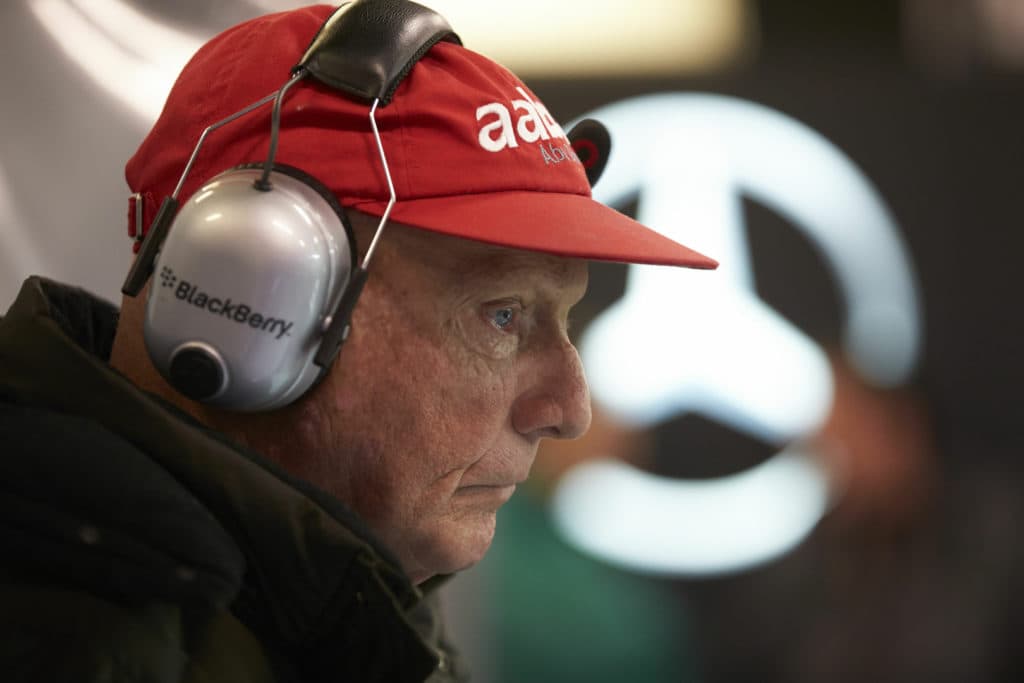Auto Bild Motorsport Editor in Chief Bianca Garloff remembers Niki Lauda. Here she talks about how she got to know him, how he influenced Formula 1 throughout her own career in motorsports.
Niki Lauda: One Name, Many Meanings
Niki Lauda. One name, many meanings: Ferrari savior; World Champion; Fire eater; Comebacker; Airline CEO; Boeing scarecrow; Little Red Riding Hood; Mercedes Ubermensch.
Now he is dead. This man who navigated this shark tank of motorsports called Formula 1 as irresistibly and elegantly as the floors of global media and the international business scene. Who in his last role, brought Lewis Hamilton to Mercedes to lay the foundation for five world titles and total dominance of his team.
Too many achievements for one human life. But Lauda wasn’t an ordinary human – after all, he had several lives. His first ended on August 1st, 1976 at the Nürburgring. At some point, he did not even want to talk about his tragic accident any more, “because it bores me.”
That is also because the Austrian was anything but a sentimental contemporary. The day of his accident, he usually liked to mention one story of that funny guy who just before the crash wanted an autograph from him.
“There was one who insisted I would mark the autograph with a date. I asked, ‘Why’ and he replied ‘It could be your last.'”
Hours later, Lauda would burn in his Ferrari and struggle for his life.
The will to survive and live was breathed into him by a priest at his hospital who was supposed to give him the last rites.
“Although my eyes were bandaged, it’s one of the few moments that I can remember clearly. I was in intensive care, severely tormented by the pain, when the nurse asked me if I wanted the last rites. I thought for a moment and decided it couldn’t hurt, so I nodded and waited for what would happen. ”
The priest thought he was talking to an unconscious man. But Lauda wasn’t, “I only knew how someone touched my shoulder, but nothing else happened, and I slowly realized that the priest had put the last rites on my shoulder without saying a word. I got angry, enraged about this thought … I expected someone to come to talk to me, comfort me, and then something like that. Silently, the priest would leave my room – that’s what made so angry, of course. I felt this enormous anger and thought: Now all the more, I will not let this go, I will not give up.”
This sheer anger brought him 52 additional years of life.
Niki Laud and Bianca Garloff
I knew Niki Lauda all my life. When I became a fan of Formula 1 and all things motorsports at the age of twelve, Niki had just brought Michael Schumacher to Ferrari in his function as a close consultant. This was the first time he turned a struggling team to one that dominated an era.
As a journalist, I would meet him as a somewhat eccentric hero. His statements: always to the point, always honest, always outright.
In general, Lauda was constantly trying hard to get straight to the point. But he also appreciated it when you did the same to him.
After the movie Rush, I went over to him and praised him almost nonchalantly: “Niki, you were a really cool guy then.” Even the hard-mannered Niki had to smile.
But one incident shaped him the most – the crash of his Lauda Air aircraft in Thailand. Unforgettable are the pictures when he personally visited the crash site. Thanks to his persistence, Boeing subsequently admitted and corrected a mistake in their thrust reverser. For him personally his greatest achievement in life.
God-Like Figure
Logically, that at some point he had to feel invincible. Several years ago, he demanded a little more respect from my reporter colleague. You could hear him complain of not receiving “the proper respect” because his argumentation would be based on a bizarre comparison of:
“After all, I’m something like a god-like appearance.”
At that time, Mercedes team boss Toto Wolff sat next to him with a knee injury. He almost fell off his crutches when we heard Niki talk like that.
Later in life, Niki finally became milder and allowed more feelings.
His twins Max and Mia softened him. His Whatsapp profile picture showed his grinning son as a constant reminder of his personal luck. In short, Lauda outed himself as a loving and caring family father.
But the body was on a path of decay. His lungs still contaminated with poisonous fumes from his fatal crash decades ago. The Lauda cough was his trademark.
When I wished him a Merry Christmas on the phone last year, his voice was weak and fragile. The fighter inside showed the first signs of weakening. It was the last time I spoke to Lauda personally.
On his 70th birthday in February his son Max picked up the phone.
“I’m afraid, Papa can’t talk right now.” I left a message for him.
Now, the lifelong fighter has given up because his body failed him.
Niki Lauda achieved everything in life. When I talked to his close friend Helmut Marko on the phone to describe Niki in one word, he replied:
“Exceptional!”
Indeed, he was sad. Like the whole world of Formula 1. And me, too.
*This article was first published in German at autobild.de/motorsport.

